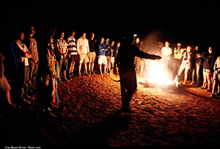Article
A portion of the Enemyway ceremonial held after sundown at the end of the first day of the ceremony. It is dance where girls can choose with whom they wish to dance, and their partners must pay for these dances. Girls are not allowed to dance with members of their clan or closely related people. A colloquial name for this dance is the Squaw Dance.
The Enemyway is sung in order to protect Navajos from harmful ghosts of slain warriors, or in more contemporary parlance, to protect Navajos from the deleterious effects of non-Native influences. This ceremonial can be used for returning military personnel to rid them of the harmful effects of evil spirits, or chindi, of the slain, as well as the associated harmful effects of modernity both on and off the reservation.
"Bonfire with Navajos inside the desert of Monument Valley, May 26, 2011" by Moyan Brenn is licensed under CC BY.
Manuscripts
References
Witherspoon, Gary
1975 Navajo Kinship and Marriage. Chicago: University of Chicago Press.
Wyman Leland
1983 Navajo Ceremonial System. In Handbook of North American Indians, Vol. 10. A.
Ortiz, ed. Pp. 536-537. Washington: Smithsonian Institution.

